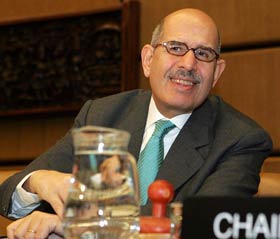
IAEA's Director General Mohamed ElBaradei waits for the start of the
IAEA's 35-nation board meeting on the escalating nuclear standoff with
Iran at Vienna's International Center yesterday. The UN nuclear watchdog
opened a meeting yesterday to discuss what line of action to take with Iran
following last month's vote to report the Islamic Republic'snuclear issue to the
UN Security Council. (Photo: Xinhua/AFP)
The chief of the UN nuclear watchdog, Mohamed ElBaradei, said Monday that a
deal over Iran's nuclear program could be just days away, avoiding any action of
the UN Security Council.
ElBaradei made the remarks ahead of a debate on Iran's nuclear issue at an
International Atomic Energy Agency (IAEA) board meeting.
"I am still very much hopeful that in the next week or so an agreement could
be reached," ElBaradei told reporters in the IAEA headquarters.
ElBaradei did not elaborate. But diplomats here believe he might be referring
to a deal between Russia and Iran on Moscow's proposal that Iran might be
allowed to retain small-scale uranium enrichment under strict IAEA surveillance
while industrial-scale enrichment is transferred to Russian soil.
Iran has been unwavering in retaining the right to nuclear fuelresearch.
Therefore, the Russian proposal might provide a face-saving deal for Tehran,
said a diplomat in Vienna, who declined to be named.
However, the Russian proposal, if proved to be real, might facestrong
resistance from Washington and the EU trio -- Britain, France and Germany, which
have had held negotiations with Iran forover two years.
The EU3 rejected an Iranian proposal last week in Vienna, underwhich Tehran
would agree to suspend industrial-scale uranium enrichment for two years in
return for nuclear research to be allowed to continue.
In an effort to move the stalled negotiations ahead, Iran mightagree to
further extend the moratorium on condition that small-scale uranium enrichment
is allowed, diplomats believe.
The United States, which has sought to bring Iran to the UN Security Council
for sanctions, may be harder to persuade into such a deal.
U.S. State Department spokesman Tom Casey said Monday he was unaware of any
specific small-scale enrichment proposal for Iran. However, he expressed concern
over the idea of allowing small-scale enrichment.
"You can't be just a little pregnant. You can't have the regimepursuing
enrichment on any scale, because pursuing enrichment on any scale allows them to
master the technology, complete the fuel cycle -- and then that technology can
easily be applied to a clandestine program for making nuclear weapons."
U.S. Undersecretary of State Nicolas Burns also outlined Washington's
hardline position on the issue on Monday.
"So unless there is dramatic about-face, I suspect the IAEA board is going to
confirm the judgment of 30 days ago -- in early February -- and then this issue
will now be taken up quite actively by the UN Security Council and that's where
it should be," Burns told the conservative Heritage Foundation.
The IAEA board decided to report Iran's case to the UN SecurityCouncil on
Feb. 4 on the understanding that the Security Council would withhold action
until this week's board meeting.
The board would discuss on Tuesday, or early Wednesday a reporton Iran's
nuclear activities by ElBaradei, which will be handed over to the Security
Council immediately after the board meeting.
The report, which was made available to the board last week, says the IAEA
could not draw a conclusion on whether or not Iran has clandestine nuclear
activities, partly due to insufficient information provided by Iran.
The report indicates that Iran seems to be accelerating uranium enrichment,
saying Tehran plans to install 3,000 centrifuges in Natanz by the fourth quarter
of the year.
Iran resumed uranium enrichment after the Feb. 4 IAEA board resolution, which
was pushed through by the EU3 and the United States.
The EU3 angrily scrapped negotiations with Iran and sought for the Feb. 4
resolution after Tehran broke seals of the IAEA and resumed nuclear fuel
research in January.
Iran temporarily agreed in November 2003 to suspend nuclear fuel activities
in exchange for political and trade incentives. But it resumed uranium
conversion, a step before uranium enrichment, in August 2005.



